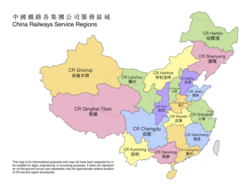China Railway
 | |
 Headquarters | |
| China Railway | |
Native name | 中国国家铁路集团有限公司 |
| Formerly | China Railway Corporation (2013–2019) |
| Company type | State-owned limited company |
| Industry | Rail transport |
| Predecessor | Ministry of Railways |
| Founded |
|
| Headquarters | Haidian District, Beijing , China |
Area served | China |
Key people | Liu Zhenfang (Chairman) Guo Zhuxue (General Manager) |
| Services | Passenger rail Freight rail |
| Revenue | |
| Total assets | |
| Total equity | |
| Owner | Ministry of Finance |
Number of employees | 2 million approx. (2013) |
| Divisions | Railway operations |
| Subsidiaries | 16 bureaux 5 companies |
| Website | |
| Footnotes / references source[1] | |
| China State Railway Group Co., Ltd. | |||||||
|---|---|---|---|---|---|---|---|
| Simplified Chinese | 中国国家铁路集团有限公司 | ||||||
| Traditional Chinese | 中國國家鐵路集團有限公司 | ||||||
| Literal meaning | China State Railway Group Limited Company | ||||||
| |||||||
| Alternative Chinese name | |||||||
| Simplified Chinese | 国铁集团 | ||||||
| Traditional Chinese | 國鐵集團 | ||||||
| Literal meaning | State Railway Group | ||||||
| |||||||
China State Railway Group Co., Ltd., doing business as China Railway (CR), is the national passenger and freight railroad corporation of the People's Republic of China.[2]
China Railway operates passenger and freight transport throughout China with 18 regional subsidiaries.[3] By September 2022, the total assets of China Railway Group are CNY 9.06 trillion (USD 1.24 trillion).[4] China has the highest railway usage in the world.[5]
History
[edit]China Railway Corporation was established in 2013 to be responsible for railroad construction, operation, and maintenance.[6]: 209
Under the Chinese Corporate Law, China Railway Corporation was reorganized into China State Railway Group Co., Ltd. on 18 June 2019. This meant the Ministry of Finance would act as an investor on behalf of the state and the company would be led by a board and managed by board-chosen executives.[7][8]
By the end of 2019, China Railway employed 2 million people and operated 139,900 km of railroads, of which 35,388 are high-speed railroads.[9]: 209-211
Logo
[edit]The China Railway logo was designed by Chen Yuchang (Chinese: 陈玉昶) (1912–1969), officially adopted on 22 January 1950. The whole logo represents the front of a locomotive. The upper part of the logo represents the Chinese character 人 (people), while the lower part represents the transversal surface of a rail. The logo means that China's railway belongs to the people.[10][11][12] The lower part represents the character 工 (labour), means that China's railway belongs to the working class.
The "CR" logo is used on the Fuxing (train) along with the China Railway logo.[13]
The "CRH" logo is used on the Hexie (train).
Companies
[edit]
There are 21 primary subsidiary companies under China Railway. As of 2008, approximately two million people work in China Railway.
| Business | Company | Provinces of operation | Regions of operation |
|---|---|---|---|
| Passenger | China Railway Harbin Group Company (CR Harbin) |
Northeastern Inner Mongolia (Hulunbuir and part of Xingan League), Heilongjiang | Northeast China |
| China Railway Shenyang Group Company (CR Shenyang) |
Liaoning (except Bohai Strait ferry), Jilin, Southeastern Inner Mongolia (Chifeng, Tongliao and part of Xingan League), southern Heilongjiang, northeastern Hebei | ||
| China Railway Beijing Group Company (CR Beijing) |
Beijing, Hebei (most parts), Tianjin, western Shandong, northern Henan, eastern Shanxi, with all the exception of Daqin Railway | North China | |
| China Railway Hohhot Group Company (CR Hohhot) |
Inner Mongolia (most parts) | ||
| China Railway Taiyuan Group Company (CR Taiyuan) |
Shanxi, also operates Daqin Railway through sub-company | ||
| China Railway Jinan Group Company (CR Jinan) |
Shandong (includes Bohai Strait ferry) | East China | |
| China Railway Shanghai Group Company (CR Shanghai) |
Shanghai, Jiangsu, Zhejiang, Anhui (most parts) | ||
| China Railway Nanchang Group Company (CR Nanchang) |
Jiangxi, Fujian | ||
| China Railway Guangzhou Group Company (CR Guangzhou) |
Hainan, most parts of Guangdong and Hunan | South China | |
| China Railway Nanning Group Company (CR Nanning) |
Guangxi, western Guangdong | ||
| China Railway Wuhan Group Company (CR Wuhan) |
Hubei, southern Henan, a little part of Anhui | Central China | |
| China Railway Zhengzhou Group Company (CR Zhengzhou) |
Henan (middle and northern parts), southern Shanxi | ||
| China Railway Chengdu Group Company (CR Chengdu) |
Sichuan (most parts), Chongqing, Guizhou (most parts), a little part of Yunnan | Southwest China | |
| China Railway Kunming Group Company (CR Kunming) |
Yunnan (most parts), a little part of Sichuan and Guizhou | ||
| China Railway Qingzang Group Company (CR Qingzang) |
Tibet | ||
| Qinghai | Northwest China | ||
| China Railway Lanzhou Group Company (CR Lanzhou) |
Gansu (most parts), Ningxia, a little part of Inner Mongolia | ||
| China Railway Ürümqi Group Company (CR Ürümqi) |
Xinjiang, a little part of Gansu | ||
| China Railway Xi'an Group Company (CR Xi'an) |
Shaanxi (most parts), northeast Sichuan | ||
| Freight | China Railway Special Cargo Service Company (CRSCS) |
Nationwide | |
| China Railway Express Company (CRE) | |||
| China Railway Container Transport Company (CRCT) | |||
Second tier subsidiaries
[edit]Corporate affairs
[edit]Business trends
[edit]The key trends for the China Railway are (as of the financial year ending 31 December):
| 2021 | 2022 | 2023 | |
|---|---|---|---|
| Revenue (RMB t) | 1.13 | 1.13 | 1.25 |
| Operating income (RMB b) | −34.8 | −54.4 | 27.47 |
| Net income (RMB b) | −49.9 | −69.6 | 3.30 |
| Total assets (RMB t) | 8.92 | 9.20 | 9.53 |
| Total equity (RMB t) | 3.00 | 3.09 | 3.22 |
| References | [14] | [15] | [16] |
International operations
[edit]International trains
[edit]China Railway operates passenger trains from China to Mongolia, Russia, Kazakhstan, North Korea, Vietnam and Laos. Also operates freight (cargo) trains to these countries.
-
The Beijing–UlaanBaatar–Moscow passenger train
There are 11 international passenger train services:
- 95/8, Dandong–Pyongyang
- 401/2, Suifenhe–Grodekovo
- K3/4, Beijing–Ulaanbaatar–Moscow
- K19/20, Beijing–(Manzhouli)–Moscow
- K23/4, Beijing–Ulaanbaatar
- K27/8, Beijing–Pyongyang
- K4651/2/3/4, Hohhot–Ulaanbaatar
- K9795/6, Ürümqi–Almaty
- K9797/8, Ürümqi–Astana
- Z5/6–T8701/2, Beijing West–Nanning (transfer station)–Gia Lâm (Hanoi)
- D887/888, Kunming South —Vientiane
Services to Europe (New Silk Route)
[edit]This section needs expansion. You can help by adding to it. (January 2017) |
As of 2017[update] China Railway ran goods services to 15 European cities, including routes to Madrid and Hamburg and the experimental East Wind service to London to test demand.[17] The Chinese government refers to the two-week 12,000 km (7,500 mi) route, starting at Yiwu and with trains to London traversing Kazakhstan, Russia, Belarus, Poland, Germany, Belgium and France, as the Belt and Road Initiative.[18] Containers must be transferred several times, as different, incompatible, rail gauges are used in different regions, and the same rolling stock cannot be used throughout.
Africa
[edit]China has been investing in and helping to rebuild railways in Africa.[19][20] Below is an incomplete list of rail projects.
List of directors general
[edit]China Railway Corporation
[edit]- Sheng Guangzu (2013–2016)
- Lu Dongfu (2016–2018)
China State Railway Group
[edit]Chairman
[edit]- Lu Dongfu (2018–2022)
- Liu Zhenfang (2022–present)
General Manager
[edit]- Yang Yudong (2018–2022)
- Guo Zhuxue (2022–present)
Footnotes
[edit]See also
[edit]- Rail transport in China
- List of locomotives in China
- China Railway High-speed
- MTR
- Passenger rail transport in China
- High-speed rail in China
References
[edit]- ^ 中国铁路总公司2015年年度报告 [China Railway Corporation 2015 Annual Report] (in Chinese). archive of Shangjai Clearing House. 29 April 2016. Archived from the original on 7 November 2017. Retrieved 6 May 2016.
- ^ "China Railway". www.china-railway.com.cn. 4 April 2020. Archived from the original on 3 November 2022. Retrieved 3 November 2022.
- ^ "中国的18个铁路局集团公司(下篇)_腾讯新闻". Tencent News. 3 February 2021. Archived from the original on 3 November 2022. Retrieved 3 November 2022.
- ^ Tang, Jun (1 November 2022). "国铁集团前三季度亏损947亿元,京沪高铁已扭亏为盈 – 环球旅讯". TravelDaily.cn. Archived from the original on 3 November 2022. Retrieved 3 November 2022.
- ^ "20 Countries With The Highest Railway Passenger Traffic in The World". Yahoo Finance. 11 April 2024. Retrieved 17 June 2024.
- ^ Lin, Shuanglin (2022). China's Public Finance: Reforms, Challenges, and Options. New York, NY: Cambridge University Press. ISBN 978-1-009-09902-8.
- ^ "China renames, restructures railway corporation in reform push". Reuters. 18 June 2019. Retrieved 18 June 2019.
- ^ 樊, 曦 (18 June 2019). "中国国家铁路集团有限公司在京挂牌成立". Xinhuanet (in Chinese). Xinhua News Agency. Archived from the original on 18 June 2019.
- ^ Lin, Shuanglin (2022). China's Public Finance: Reforms, Challenges, and Options. New York, NY: Cambridge University Press. ISBN 978-1-009-09902-8.
- ^ "中国铁路标志的设计者——陈玉昶 60年前的标志还是这么简洁、漂亮!_刘逸设计_新浪博客". Blog.sina.com.cn. 13 March 2013. Retrieved 31 July 2015.
- ^ "Rologo 标志共和国 | 专注于Logo的网站_Logo设计_Logo欣赏 » 中国铁路标志的设计者——陈玉昶". Rologo.com. Archived from the original on 25 November 2015. Retrieved 31 July 2015.
- ^ 路徽的来历.
- ^ 天津站的复兴号CR400AF标准动车组.
- ^ "China Railway Annual Report 2021" (PDF). China Railway. Retrieved 15 July 2024.
- ^ "China Railway Annual Report 2022" (PDF). China Railway. Retrieved 15 July 2024.
- ^ "China Railway Annual Report 2023" (PDF). China Railway. Retrieved 15 July 2024.
- ^ Tracy McVeigh (14 January 2017). "Silk Road route back in business as China train rolls into London". The Guardian. Retrieved 15 January 2017.
- ^ "Travelling from China to London - BBC News". BBC. 18 January 2017. Retrieved 18 January 2017.[permanent dead link]
- ^ O'Dowd, Emily. "Special report: How five major African rail projects are supported by China". Retrieved 18 September 2018.
- ^ Kacungira, Nancy (8 June 2017). "Is Kenya's new railway good value for money?". BBC News. Retrieved 18 September 2018.
- ^ "The Report: Algeria 2010 page 165". Oxford Publishing Group. Retrieved 18 January 2017.
- ^ a b "Chinese Funded Railways". CNN. 22 November 2016. Retrieved 18 January 2017.
- ^ "Government Signs Commercial Contract for the Nairobi to Malaba SGR Section with CCCC". Kenya Railways. Retrieved 18 January 2017.[permanent dead link]
- ^ "Mali signs $11bn agreements with China for new rail projects". Railway Technology. 16 September 2014. Archived from the original on 31 January 2017. Retrieved 18 January 2017.
- ^ "China to build major new African railway from Mali to the coast". Global Construction Review. 4 January 2016. Retrieved 18 January 2017.
- ^ "CCECC sign $11.117 billion Lagos-Calabar Rail Contract line". The Guardian. 2 July 2016. Retrieved 18 January 2017.
- ^ "Abuja-Kaduna Rail line". Railway Technology. Retrieved 18 January 2017.
- ^ "Construction of railway from Khartoum to Port Sudan". Aiddata. Archived from the original on 9 January 2017. Retrieved 18 January 2017.
- ^ Lumu, David; Balagadde, Samuel (30 August 2014). "Chinese Firm CHEC Given US$8 Billion Railway Deal". New Vision (Kampala). Retrieved 30 August 2014.
- ^ Jin, Haixing (31 March 2015). "China's Xi Finds Eight Good Reasons to Host Uganda's President". Bloomberg News. Retrieved 1 April 2015.
- ^ "Museveni Signs Deal With Chinese Company To Construct Kasese Railway Line". Daily Monitor (Kampala). 30 March 2015. Retrieved 1 April 2015.



